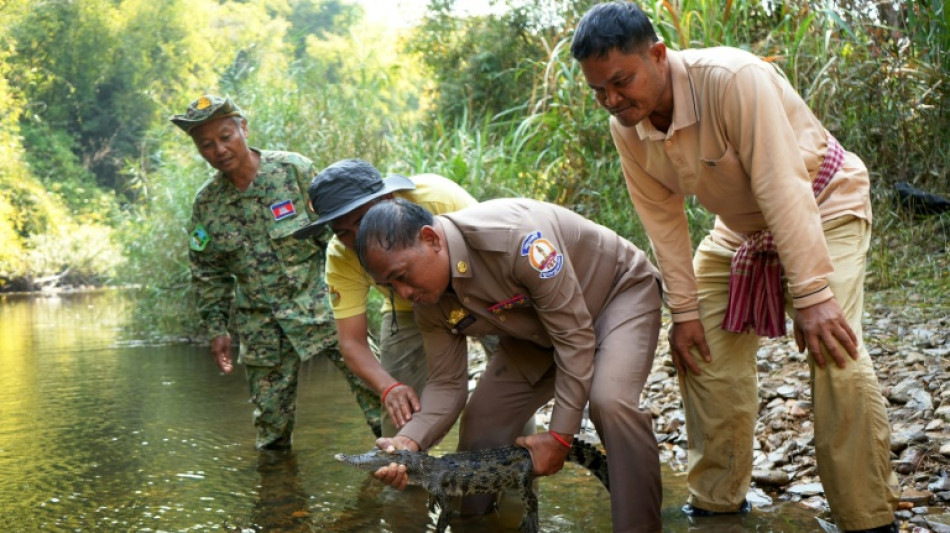
-
 England lose Duckett in chase of record 435 to keep Ashes alive
England lose Duckett in chase of record 435 to keep Ashes alive
-
Australia all out for 349, set England 435 to win 3rd Ashes Test

-
 US strikes over 70 IS targets in Syria after attack on troops
US strikes over 70 IS targets in Syria after attack on troops
-
Australian lifeguards fall silent for Bondi Beach victims

-
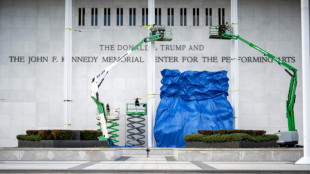 Trump's name added to Kennedy Center facade, a day after change
Trump's name added to Kennedy Center facade, a day after change
-
West Indies 206-2, trail by 369, after Duffy's double strike
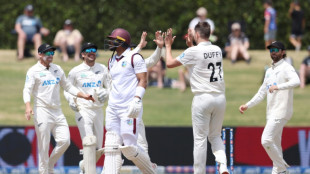
-
 US strikes Islamic State group in Syria after deadly attack on troops
US strikes Islamic State group in Syria after deadly attack on troops
-
Epstein files opened: famous faces, many blacked-out pages
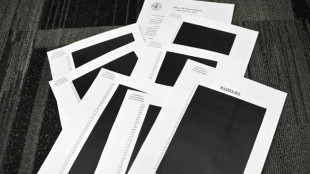
-
 Ravens face 'special' Patriots clash as playoffs come into focus
Ravens face 'special' Patriots clash as playoffs come into focus
-
Newly released Epstein files: what we know

-
 Musk wins US court appeal of $56 bn Tesla pay package
Musk wins US court appeal of $56 bn Tesla pay package
-
US judge voids murder conviction in Jam Master Jay killing

-
 Trump doesn't rule out war with Venezuela
Trump doesn't rule out war with Venezuela
-
Haller, Aouar out of AFCON, Zambia coach drama

-
 Nasdaq rallies again while yen falls despite BOJ rate hike
Nasdaq rallies again while yen falls despite BOJ rate hike
-
Bologna win shoot-out with Inter to reach Italian Super Cup final

-
 Brandt and Beier send Dortmund second in Bundesliga
Brandt and Beier send Dortmund second in Bundesliga
-
Trump administration begins release of Epstein files

-
 UN Security Council votes to extend DR Congo mission by one year
UN Security Council votes to extend DR Congo mission by one year
-
Family of Angels pitcher, club settle case over 2019 death

-
 US university killer's mystery motive sought after suicide
US university killer's mystery motive sought after suicide
-
Rubio says won't force deal on Ukraine as Europeans join Miami talks

-
 Burkinabe teen behind viral French 'coup' video has no regrets
Burkinabe teen behind viral French 'coup' video has no regrets
-
Brazil court rejects new Bolsonaro appeal against coup conviction

-
 Three-time Grand Slam winner Wawrinka to retire in 2026
Three-time Grand Slam winner Wawrinka to retire in 2026
-
Man Utd can fight for Premier League title in next few years: Amorim

-
 Pandya blitz powers India to T20 series win over South Africa
Pandya blitz powers India to T20 series win over South Africa
-
Misinformation complicated Brown University shooting probe: police

-
 IMF approves $206 mn aid to Sri Lanka after Cyclone Ditwah
IMF approves $206 mn aid to Sri Lanka after Cyclone Ditwah
-
US halts green card lottery after MIT professor, Brown University killings
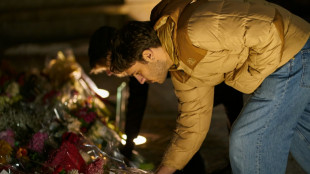
-
 Stocks advance as markets cheer weak inflation
Stocks advance as markets cheer weak inflation
-
Emery says rising expectations driving red-hot Villa

-
 Three killed in Taipei metro attacks, suspect dead
Three killed in Taipei metro attacks, suspect dead
-
Seven Colombian soldiers killed in guerrilla attack: army

-
 Amorim takes aim at Man Utd youth stars over 'entitlement'
Amorim takes aim at Man Utd youth stars over 'entitlement'
-
Mercosur meets in Brazil, EU eyes January 12 trade deal

-
 US Fed official says no urgency to cut rates, flags distorted data
US Fed official says no urgency to cut rates, flags distorted data
-
Rome to charge visitors for access to Trevi Fountain

-
 Spurs 'not a quick fix' for under-fire Frank
Spurs 'not a quick fix' for under-fire Frank
-
Poland president accuses Ukraine of not appreciating war support

-
 Stocks advance with focus on central banks, tech
Stocks advance with focus on central banks, tech
-
Amorim unfazed by 'Free Mainoo' T-shirt ahead of Villa clash

-
 PSG penalty hero Safonov ended Intercontinental win with broken hand
PSG penalty hero Safonov ended Intercontinental win with broken hand
-
French court rejects Shein suspension

-
 'It's so much fun,' says Vonn as she milks her comeback
'It's so much fun,' says Vonn as she milks her comeback
-
Moscow intent on pressing on in Ukraine: Putin

-
 UN declares famine over in Gaza, says 'situation remains critical'
UN declares famine over in Gaza, says 'situation remains critical'
-
Guardiola 'excited' by Man City future, not pondering exit

-
 Zabystran upsets Odermatt to claim first World Cup win in Val Gardena super-G
Zabystran upsets Odermatt to claim first World Cup win in Val Gardena super-G
-
Czechs name veteran coach Koubek for World Cup play-offs


'We will preserve them': saving Cambodia's crocodiles
A motorbike rider inches slowly over bumpy terrain deep in Cambodia's Virachey national park, carefully adjusting the basket strapped behind him. Inside is precious cargo -- a critically endangered Siamese crocodile.
The reptile is one of 10 being released into the park in Cambodia's northeast for the first time -- part of a years-long effort that has brought the Siamese crocodile back from the brink of extinction in the wild.
"Often what we see is species are declining, species are disappearing," said Pablo Sinovas, Cambodia country director for the Fauna & Flora conservation group, which has led the conservation programme.
"In this case, we are seeing actually that the species seems to be recovering."
The crocodile, which can grow up to four metres (13 feet) long, is distinguished by dragon-like bony crests behind each eye.
Just 25 years ago, experts feared that the Siamese crocodile might no longer exist outside zoos and the crocodile farms that helped decimate its population.
But in 2000, a biodiversity survey led by Fauna & Flora uncovered a small number in the remote Cardamom Mountains in southwest Cambodia, kicking off a conservation effort that has given the species a 400-strong foothold in the country.
Discoveries and conservation elsewhere mean there are now up to 1,000 Siamese crocodiles in the wild globally, though in just one percent of its former range.
Cambodia has been central to that success, said crocodile expert Charlie Manolis, chief scientist at Wildlife Management International in Australia.
"There's an opportunity in Cambodia," he said, explaining that, unlike neighbouring Thailand and Vietnam, there are still "large tracts" of protected land.
- 'Best possible headstart' -
Key to Cambodia's effort is a programme to help the species -- which was once found all over Southeast Asia -- breed more successfully.
In the wild, fragmented populations might struggle to find a mate, and both eggs and juvenile offspring are vulnerable to predators.
For every 50 or so born in the wild, perhaps as few as three survive, said Joe Rose, captive breeding officer at the Phnom Tamao facility outside Phnom Penh.
"Breeding within a facility like this, we can ensure a 100 percent survival rate from hatchlings... and healthy young crocodiles to take out and release, to give them the best possible headstart", Rose said.
There are around 200 crocodiles at the facility at any one time, including 50 breeding adults, who produced nearly 200 eggs last year.
Eggs are taken into incubators, and hatchlings are raised in enclosures with progressive exposure to the fish and frogs they will one day catch in the wild.
After several years, they are ready for release.
Until now, that has meant heading to the Cardamom Mountains, where last year 60 crocodiles were recorded hatching in the wild -- the highest number in a century.
The growing population holds promise not just for the species but for its broader environment too.
Crocodiles are top predators which regulate their ecosystems, and there is evidence that fish diversity is higher in the rivers they inhabit.
The conservation effort's growing success has bred a need for new habitats, a challenge given that crocodiles need space, prey and enough distance away from humans to minimise conflict.
Virachey's rugged, remote terrain makes it ideal, with relatively untouched plant and animal life, and few residents.
"It's essentially protected mostly by the remoteness," said Sinovas.
- Ultrasound 'pings' -
Releasing the crocodiles into a new environment is still risky.
They could face predators or struggle to feed themselves -- and tracking their progress can be difficult and expensive.
"Often reintroduction programmes with crocodilians, you sort of hurl them all out there, and then everybody sort of walks away and hopes that they live and grow," said Manolis.
But Fauna & Flora will keep tabs using acoustic monitors, inspired by lessons from Australian crocodile conservation efforts.
In Phnom Tamao, each of the 10 crocodiles is fitted with a thimble-sized transmitter, placed beneath their dappled scaly skin.
These send ultrasound "pings" every time the creatures pass receivers placed along a 10-kilometre stretch of their new river home in Virachey.
The data will be recorded for several months and then collected and analysed for clues on the programme's success.
Reaching their new home was no easy task for the reptiles.
First, there was 18 hours of travel in cylindrical bamboo baskets transported by car, motorbike and boat. Next, they acclimatised in a temporary enclosure.
Receivers were installed and checked, and then it was time.
Electrical tape that had been wound around their snouts to prevent snapping was peeled away, and each creature was gradually lowered into the water.
They quickly splashed away, carrying great hopes on their scaly shoulders.
Conservationists credit part of their success to cooperation with local communities, who have protected crocodiles in the Cardamoms and helped document new hatchlings.
For Choub Srak Er, a resident and ranger at Virachey, the reptiles offer hope.
"These crocodiles disappeared a long time ago," he said. "We are so happy, we will preserve them together."
J.Horn--BTB
